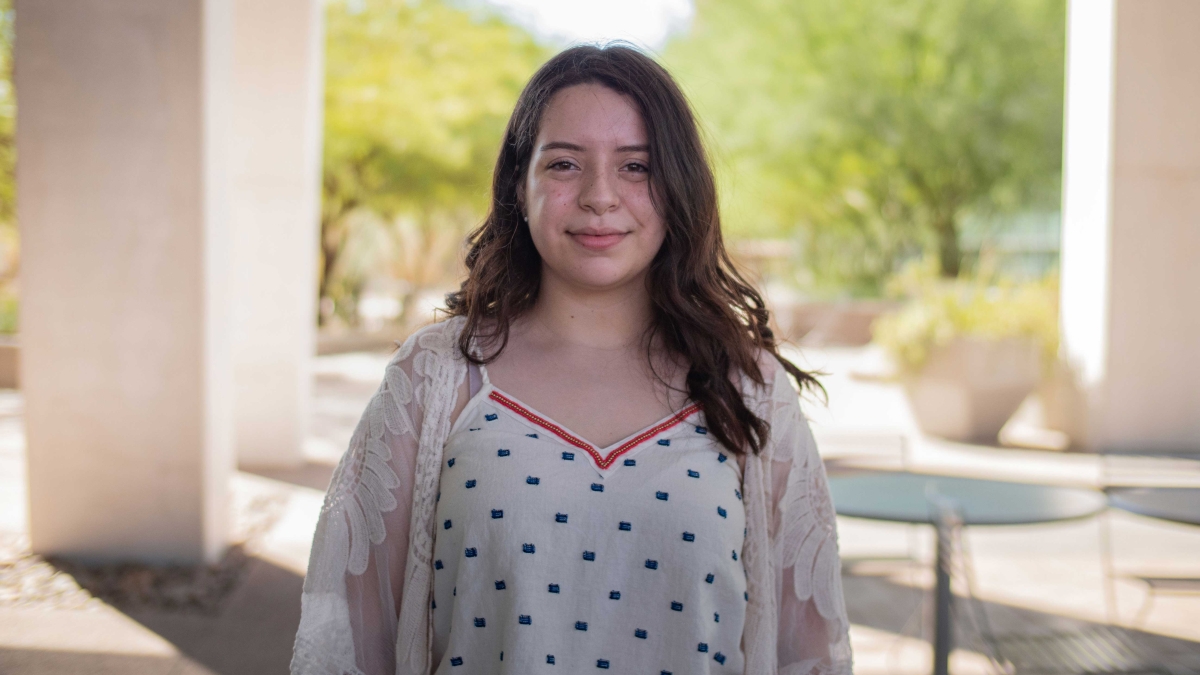Valeria Gutierrez is a sophomore majoring in psychology who conducts research as part of the Arizona Twin Project. She is a recipient of the new Jenessa Shapiro Undergraduate Research Scholarship launched this fall in Arizona State University's Department of Psychology.
“I am currently a research assistant with the on-call team," Gutierrez said. "Our team is the one in charge of maintaining contact with all the families that participate in our study. When it's a family's time to participate, we send them actigraphy watches to record nighttime movement and see if they are getting effective sleep or if they are simply tossing and turning at night. We also send vials to collect saliva to measure their cortisol or stress levels.”
The Arizona Twin Project is a joint effort between the Child Emotion Center and the Adolescent Stress and Emotion Lab at ASU. The research is conducted by Associate Professor and Developmental Area Head Leah Doane, Professor Mary Davis and Professor Kathryn Lemery-Chalfant, who focus on the complex gene and environmental factors contributing to the development of stress, sleep and emotion regulation. This project is an ongoing longitudinal study funded over the last six years by the Eunice Kennedy Shriver National Institute of Child Health and Human Development, designed to explore the risk and resilience predictors of common mental and physical health problems during infancy, childhood and adolescence.
The overarching goal of the Arizona Twin Project addresses a central developmental question — how resilience develops and affects the impact of early risk on child physical health and common mental health disorders such as attention deficit hyperactivity disorder, conduct problems, anxiety and depression.
Gutierrez’s interests are wide ranging, including exploring research into false confessions in criminology investigations and sleep deprivation.
“Personally, I’d like to investigate how stress may affect the efficiency of sleep or a lack of sleep,” Gutierrez said.
Video by the ASU Department of Psychology
Expanding opportunity for underrepresented women in STEM
According to the International Journal of STEM Education, women are “significantly underrepresented in STEM” careers, making up less than 25% of those working in STEM occupations. Additionally, Hispanic, Asian and African American women each receive less than 5% of the STEM bachelor’s degrees in the U.S.
Gutierrez has enjoyed being mentored by three different female faculty members and mentions that as a driving factor in her future research pursuits.
“All three faculty mentors are so different in their research and in their instruction, but they are all such incredibly strong women and it has been great to learn from each of them,” Gutierrez said.
The Jenessa Shapiro Undergraduate Research Scholarship, which is dedicated to supporting annually one to two students with funding of up to $5,000, is designed to support and augment research by underrepresented students by removing financial barriers to entry. These students previously may have had to work or meet certain time obligations outside of the lab that prevented in-depth research projects or participating in a research lab.
“One thing this scholarship allows me to do is to explore research beyond what I was planning on doing for my classes. It gives me the opportunity to really build up my research foundation for graduate school,” Gutierrez said.
“The important part of representing underrepresented students is that many of us don’t feel like we have a place in a research setting. We often feel excluded from research opportunities because it just isn’t our place. Choosing to support underrepresented students not only helps to raise them, but it raises their culture with them.”
Serving others
Gutierrez also a deep passion for service and has been participating in Rotary Club organizations since high school. She is now the social media chair for the Phoenix chapter of Rotaract.
The Rotaract club engages students with community leaders to work side by side and to take action through service, to ultimately change the lives of the local community.
“A portion of our member dues gets donated to the Navajo Water Project. This helps to provide clean running water and solar to Navajao families,” Gutierrez said. “A lot of the times we forget about the needs in our own community, and I think that the Navajo community frequently gets forgotten and we can make a major impact locally.”
RELATED: Psychology student receives scholarship to research perception and neuroscience
Top photo of Valeria Gutierrez by Robert Ewing/ASU
More Science and technology

ASU professor breeds new tomato variety, the 'Desert Dew'
In an era defined by climate volatility and resource scarcity, researchers are developing crops that can survive — and thrive — under pressure.One such innovation is the newly released tomato variety…

Science meets play: ASU researcher makes developmental science hands-on for families
On a Friday morning at the Edna Vihel Arts Center in Tempe, toddlers dip paint brushes into bright colors, decorating paper fish. Nearby, children chase bubbles and move to music, while…

ASU water polo player defends the goal — and our data
Marie Rudasics is the last line of defense.Six players advance across the pool with a single objective in mind: making sure that yellow hydrogrip ball finds its way into the net. Rudasics, goalkeeper…


